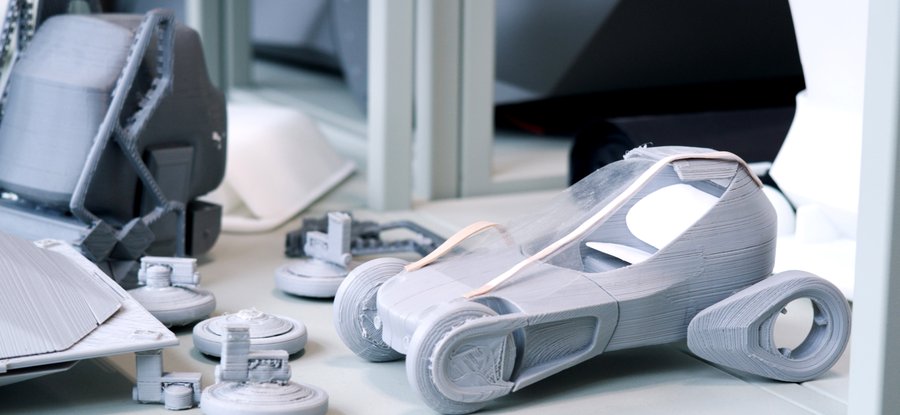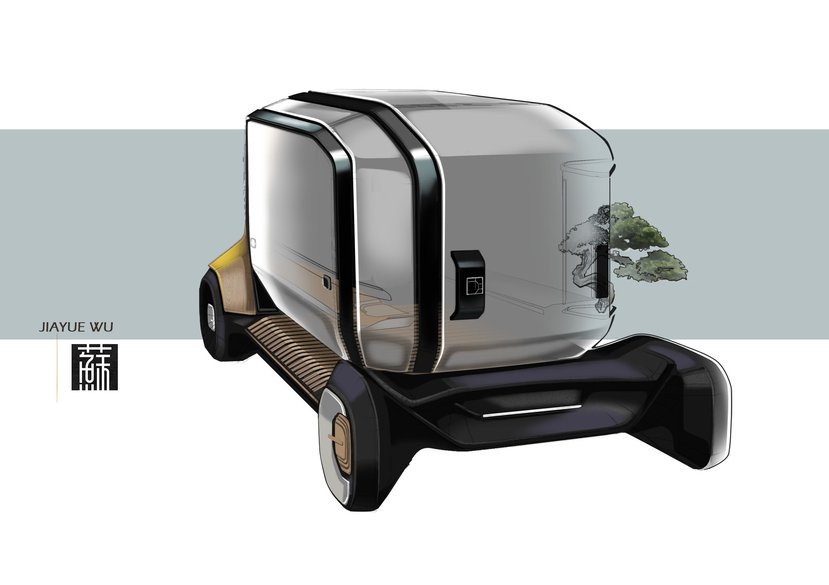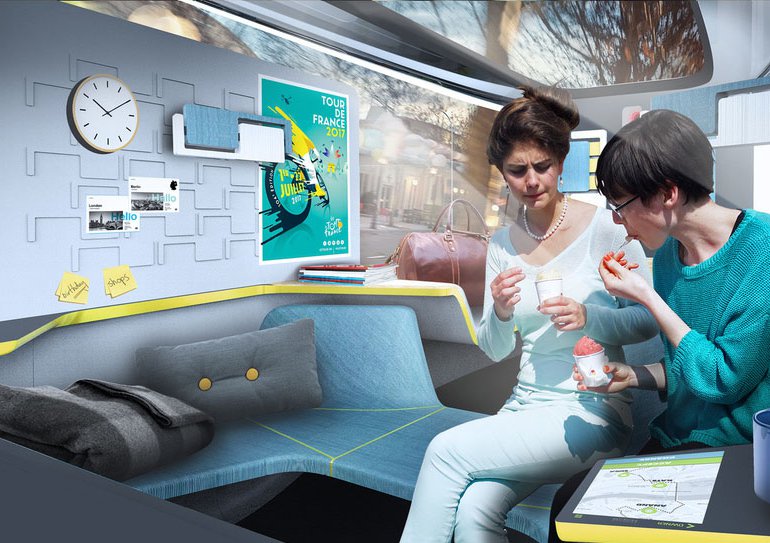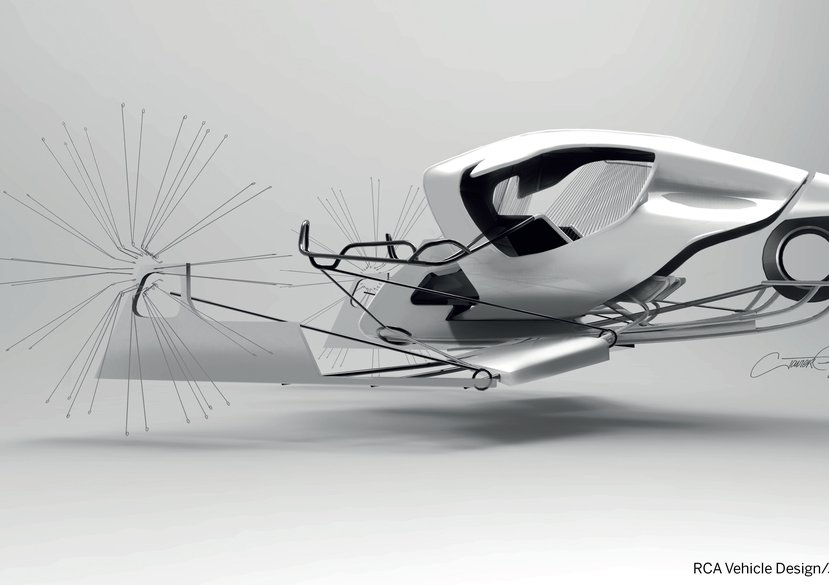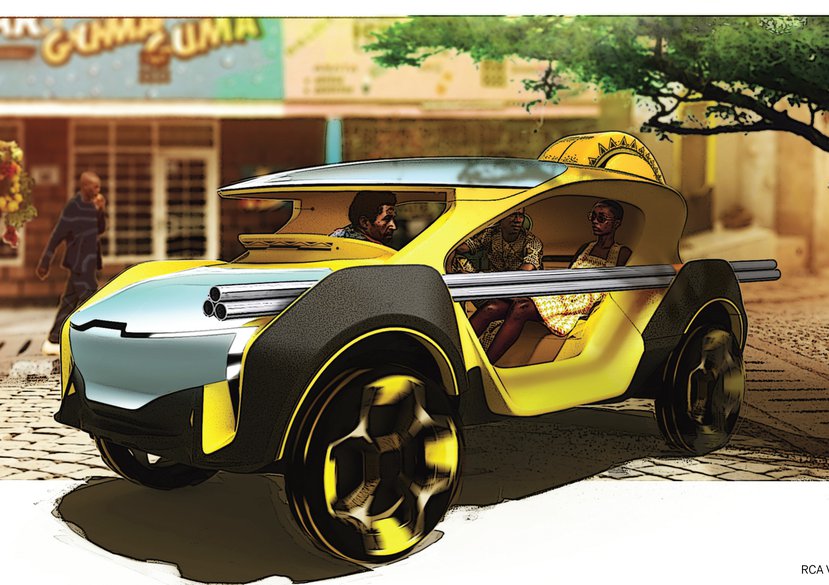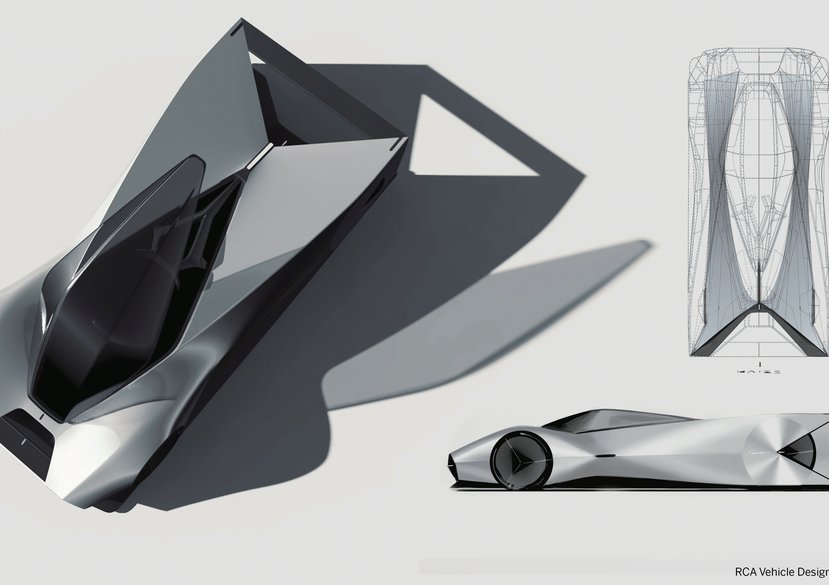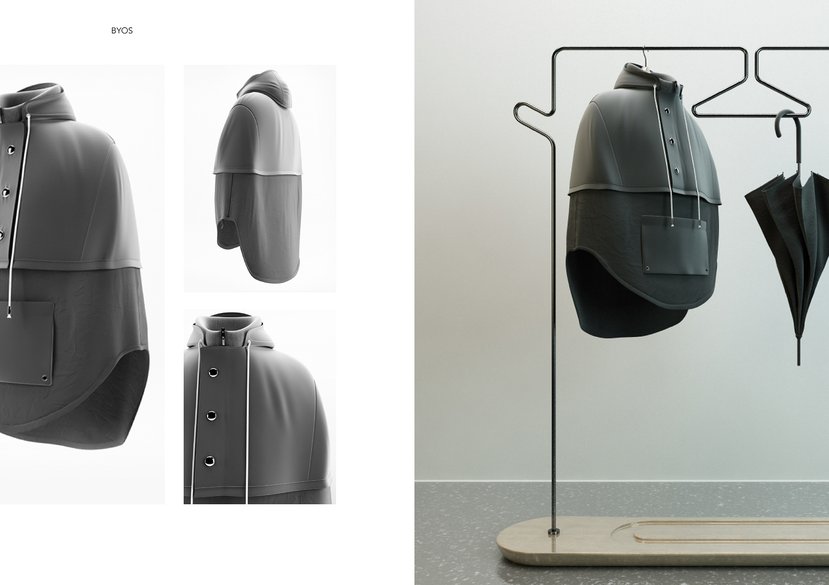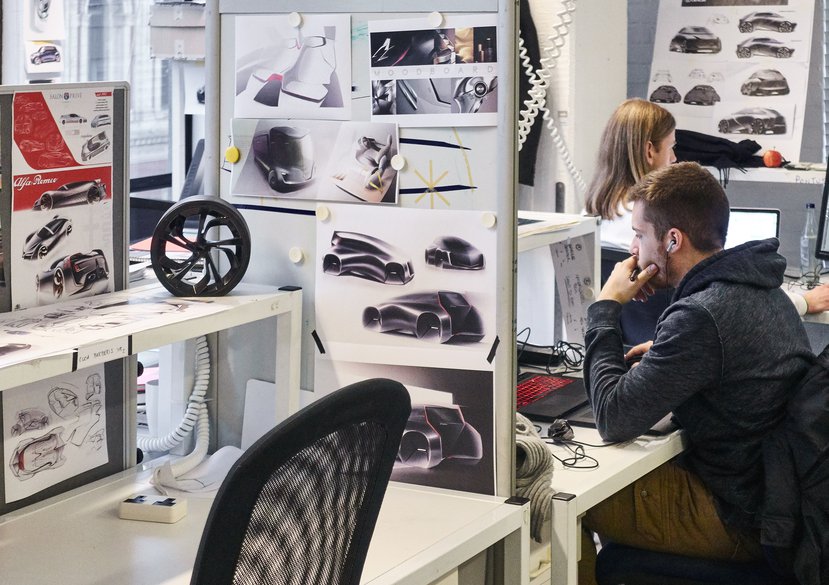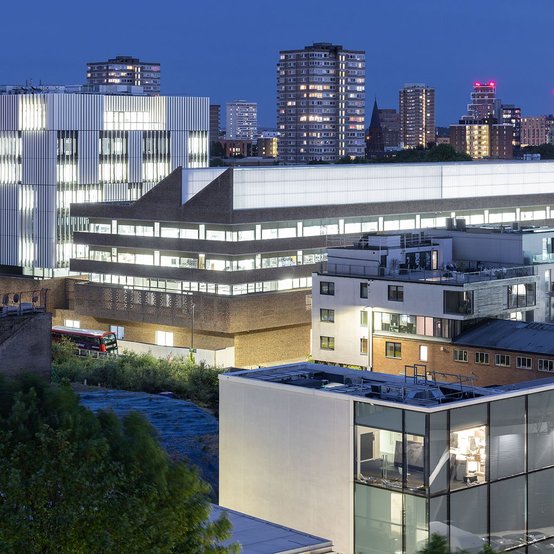
Overview
Designing the future of mobility
Key details
- 180 credits
- 1 year programme
- Full-time study
School or Centre
Location
- Battersea
Next open event
- 27 Nov 2024
- Visit Online Portfolio Week
Round 1 application deadline
- 13 Jan 2025
Become a design leader with the skills to influence.
- Learn how to develop and deliver advanced solutions to holistic mobility challenges and opportunities.
- Benefit from an approach that translates techno-cultural challenges through intense creativity and research.
- Work closely with mobility design practitioners, thought leaders and leading brands.
Intelligent Mobility builds on the rich history of vehicle and transport design at the RCA, placing this in the context of new social, cultural, and technical changes. These include the shift to autonomous systems, renewable power, demographic changes, and the increasing synthesis between man and machine.
Our programme defines and describes a paradigm shift that combines existing fields with a design-led approach. Studying with us, you’ll learn how design for the physical and virtual aspects of mobility space and human experience as an integrated whole.
Become an innovative design leader
Our students create advanced design and innovation concepts for new mobility opportunities. Our expert teaching team will help you understand industrial practice and encourage you to ask critical questions relating to brand, business, production, ownership and use.
Our commercial, connected approach creates leaders in automotive and mobility design and the broad spectrum of mobility services and artefacts. You’ll become part of a new generation of designers with a broad range of abilities, who have both the insight and ambition to make an impact in an increasingly diverse industry.
Gallery
Staff
Facilities
The School of Design is based across our Battersea and Kensington sites.
View all facilitiesStudents have access to the College’s workshops, with traditional facilities for woodworking, metalworking, plastics and resins, including bookable bench spaces. Computer-driven subtractive milling equipment is available, as well as additive rapid prototyping.
Our alumni
Our alumni form an international network of creative individuals who have shaped and continue to shape the world. Click on each name to find out more.
Where will the RCA take you?More details on what you'll study.
Find out what you'll cover in this programme.
What you'll cover
How will I learn?
The programme will deploy a range of teaching/learning strategies to build skills at a number of levels during the MA as follows:
- Personally directed study will be encouraged during the programme and will be a focus for the IRP as part of the strategic/ideological goals of the programme. Such study will be guided by tutors through regular personal and group tutorials as below.
- Personal tutorials will be used to explore and challenge students' attitudes and knowledge about their work in context between individual students and their tutor.
- Group tutorials will be used to debate issues across student cohorts and tutors and to examine ideas at depth.
- Group seminars will be used to provide a range of contextual and ideological knowledge to students on the programme.
- Group workshops and skills training will be used to build key skills in a range of areas during the programme. Typical examples include: specialist CAD training, research skills workshops, bespoke short skills projects.
- Individual interim project presentation and reviews (non-examined) will be used to assess and debate students work during projects - leading to verbal and written feedback being given.
- Final examinations will be used to critically appraise work and provide feedback by an examination board on work submitted for a unit.
Programme structure
Term 1
- People and places: This unit provides a framework to understand how and where future mobility fits into a changing global landscape and how people and place connect through mobility. The unit aims to sensitise you to the scope and limits of different mobility typologies within the mobility mix and highlights the need for design to meet broader infrastructural and social requirements.
- Humanising technology: This unit aims to explore how recent transformational mobility technologies such as autonomy and electrification can be interpreted to provide new and desirable human interactions in mobility. You are expected to gain a profound and critical understanding of emerging technologies and their place in future mobility design.
Term 2
- Automotive transitions: This unit focuses on the future of the automotive typology and asks you to reimagine how technology and social trends will influence future automotive design. The unit provides a deep context into the key elements of future automotive design with an emphasis on advanced manufacturing, contemporary socio-cultural issues and questions related to future business models.
- Grand Challenge: In term 2 all School of Design students will participate in the Grand Challenge, School-wide unit. The aim of this unit is to connect and challenge all students in the School through the introduction of a ‘wicked’ design problem that requires a cross disciplinary approach to problem solving which may involve external international partners. This unit and lecture series has been hugely successful in connecting and disrupting disciplines, people, philosophies and approaches to design thinking whilst providing our student body with very unique networking opportunities.
Terms 1 and 2
Across terms 1 and 2, you will participate in AcrossRCA.
Term 3
Independent Research Project: This is the final Master’s project and asks students to identify, develop and address a defined research question which is both socially relevant and technically challenging. The work must be documented at all stages for public dissemination. This will take the form of a physical and/or digital (virtual) exhibition of a selection of the students work during their 3 terms. You are responsible for the intellectual and technical evolution of this project and for leading the research and development of ideas and insights through different stages of the design process. This includes working out who the stakeholders are, how to research and the development of thinking through different media; notably from 2D to 3D and to an appropriate level of resolution. The scope of the IRP will be agreed with you, and the support of your tutor and will include the following:
- a clearly articulated research question or problem.
- a defined rationale for the scope of the project including a perspective from the identified global opportunity and the students’ personal skills and motivations.
- a plan/methodology for the development of the work.
- a fully resolved vision of the work in appropriate media and a clear evidence path which has all the necessary elements of research to underpin the logic reasoning and creative decisions to narrate the IRP student journey.
AcrossRCA
AcrossRCA is a compulsory 30-credit unit which is delivered as part of all MA programmes.
Situated at the core of your RCA experience, this ambitious interdisciplinary College-wide unit supports you in responding to the challenges of complex, uncertain and changing physical and digital worlds. Developed in response to student feedback, AcrossRCA creates an exciting opportunity for you to collaborate meaningfully across programmes.
Challenging you to use your imagination and intellect to respond to urgent contemporary themes, this ambitious unit will provide you with the opportunity to:
- make connections across disciplines
- think critically about your creative practice
- develop creative networks within and beyond the College
- generate innovative responses to complex problems
- reflect on how to propose ideas for positive change in local and/or global contexts
AcrossRCA launches with a series of presentations and panel discussions from acclaimed speakers who will introduce the themes and act as inspirational starting points for your collaborative team response.
Delivered online and in-person across two terms, the unit has been designed to complement your disciplinary studies and to provide you with a platform to thrive beyond graduation.
Requirements
What you need to know before you apply
Candidates are selected entirely on merit and applications are welcomed from all over the world. The selection process considers creativity, imagination and innovation as demonstrated in your portfolio, as well as your potential to benefit from the programme and to achieve high MA standards overall.
You’ll have completed or be in the final year of a first degree in an art and design (or related) subject. Alongside this, you’ll need proven commitment to the discipline, with a high level of self-motivation and evidence of independent study. You should possess a high standard of illustrative skills and an understanding of 3D form.
What's needed from you
Portfolio requirements
The MA Intelligent Mobility extends traditional vehicle and transport design into a visionary, transformative and connective approach to future mobility
In your portfolio submission, we want to specifically see:
- Design excellence and a clear sense of design sensitivity in its broadest sense - evidenced through projects which look to the future of what mobility can be. Projects which explore important areas such as sustainable design, emotional technology, autonomy, urban infrastructure and future mobility typologies.
- Skills and ability to analyse and transform ideas from 2D, sketching and imaging into 3D. Evidence of testing ideas through making and materiality and experimenting with this process.
- Understanding of vehicles and brands and an interest in the relationships between mobility design and other disciplines such as architecture, consumer products, fashion, fine art and engineering/innovation practice.
- Design research and a deep interest in people and social context as a way of generating new insights and directions.
- Passion and personal identity – for example through the style and development of your thinking or the way you use media to express and develop your ideas and ideology.
Video requirements
We ask that you upload a two-minute video recorded on your phone or laptop, speaking to us directly. High production qualities are not needed. We will review the work in your portfolio, so keep your video simple.
In your video please tell us about yourself, specifically:
- Why you want to enter the mobility design sector – what is your ambition and motivation?
- Why you want to come to the RCA and what you hope to gain by joining the Intelligent Mobility programme?
- Explain where you feel the greatest opportunities and challenges are for companies and designers in the mobility design sector.
- Specific areas you wish to explore and focus on in your studies and throughout your career, what are your motivations and interests.
- Highlight a key project or projects in your folio you wish to draw our attention to and explain what you think is especially strong about it and the skills and outcomes that make this special.
- If you could set your own project (i) what would it be and (ii) how would you undertake the project – what key steps would you take.
English-language requirements
If you are not a national of a majority English-speaking country you will need the equivalent of an IELTS Academic or UKVI score of 6.5 with a 6.0 in the Test of Written English (TWE) and at least 5.5 in other skills. Students achieving a grade of at least 6.0, with a grade of 5.5 in the Test of Written English, may be eligible to take the College’s English for Academic Purposes course to enable them to reach the required standard.
You are exempt from this requirement if you have received a 2.1 degree or above from a university in a majority English-speaking nation within the last five years.
If you need a Student Visa to study at the RCA, you will also need to meet the Home Office’s minimum requirements for entry clearance.
Fees & funding
For this programme
Fees for new students
Fees for September 2025 entry on this programme are outlined below. From 2021 onward, EU students are classified as Overseas for tuition fee purposes.
Home
Overseas and EU
Deposit
New entrants to the College will be required to pay a non-refundable deposit in order to secure their place. This will be offset against the tuition fees.
Home
Overseas and EU
Progression discount
For alumni and students who have completed an RCA Graduate Diploma and progress onto an RCA Master's programme – MA, MA/MSc, MFA, MDes, MArch, MEd or MRes – within 10 years, a progression discount of £1,000 is available.
* Total cost is based on the assumption that the programme is completed in the timeframe stated in the programme details. Additional study time may incur additional charges.
Scholarships
Scholarships
The RCA scholarship programme is growing, with hundreds of financial awards planned for the 2025/6 academic year.
For more information and examples of financial awards offered in 2024/25, visit the Scholarships & awards webpage.
You must hold an offer to study on an RCA programme in order to make a scholarship application in Spring 2025. A selection of RCA merit scholarships will also be awarded with programme offers.
We strongly recommend that you apply for your programme as early as possible to stand the best chance of receiving a scholarship. You do not apply directly for individual awards; instead, you will be invited to apply once you have received an offer.
More information
Additional fees
In addition to your programme fees, please be aware that you may incur other additional costs associated with your study during your time at RCA. Additional costs can include purchases and services (without limitation): costs related to the purchase of books, paints, textiles, wood, metal, plastics and/or other materials in connection with your programme, services related to the use of printing and photocopying, lasercutting, 3D printing and CNC. Costs related to attending compulsory field trips, joining student and sport societies, and your Convocation (graduation) ceremony.
If you wish to find out more about what type of additional costs you may incur while studying on your programme, please contact the Head of your Programme to discuss or ask at an online or in person Open Day.
We provide the RCASHOP online, and at our Kensington and Battersea Campuses – this is open to students and staff of the Royal College of Art only to provide paid for materials to support your studies.
We also provide support to our students who require financial assistance whilst studying, including a dedicated Materials Fund.
External funding
There are many funding sources, with some students securing scholarships and others saving money from working. It is impossible to list all the potential funding sources; however, the following information could be useful.
Payments
Tuition fees are due on the first day of the academic year and students are sent an invoice prior to beginning their studies. Payments can be made in advance, on registration or in two instalments.
Start your application
Change your life and be here in 2025. Applications now open.
The Royal College of Art welcomes applicants from all over the world.
Before you begin
Make sure you've read and understood the entrance requirements and key dates
More information about eligibility and key datesCheck you have all the information you need to apply.
Read our application process guideConsider attending an Open Day, or one of our portfolio or application advice sessions
See upcoming sessionsPlease note, all applications must be submitted by 12 noon on the given deadline.
Ask a question
Get in touch if you’d like to find out more or have any questions.

